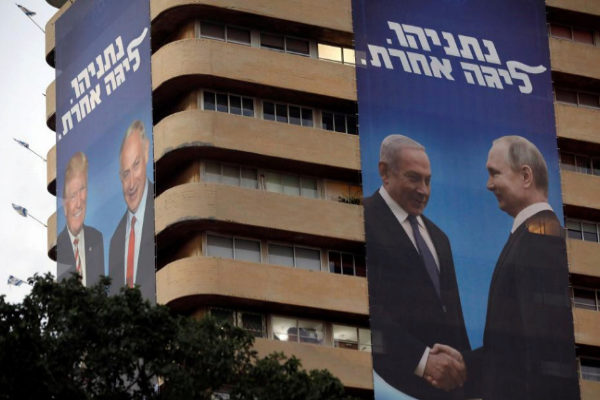- Israel.Benjamin Netanyahu breaks Ben Gurion's record
- Middle East: Israel demolishes a dozen Palestinian homes in East Jerusalem
- Palestinian-Israeli conflict 'American Pax' for the Middle East
Seven weeks after the second elections in six months in Israel, the closing of the lists clears the lush electoral landscape but does not dissipate the political clouds of the day after. Since popular pressure to avoid new elections will force parties to agree even with those who are now attacking, the game is more open than ever.
Among the 32 lists submitted (a dozen with real options) for the twenty-second Knesset, Prime Minister Benjamin Netanyahu's Likud and former Blue and White centrist block of former general Benny Gantz will be the most voted as last April 9 but they will need many pacts to govern. If there is no other choice, among themselves despite the fact that today Netanyahu discards it because he prefers his more nationalist and ultra-Orthodox right-wing partners while Gantz maintains the sanitary cordon to the leader of the Likud by being charged-prior hearing in October-for three cases of corruption
With the peace process with the Palestinians stalled and the consensus against Iran, the Israeli electoral repechance focuses on the state-religion relationship, the role of the Supreme Court , on future pacts and, of course, on Netanyahu. This cunning politician, in power since 2009, is already the longest-running prime minister.
After the closing of the lists that formalize the tactical alliances to cross the demanding threshold of 3.25% of the votes, the electoral race has two key stages: the finish line (17-S) and the distribution of medals, that is, from ministries in the complex mission of forming a coalition. Netanyahu arrived victorious at the goal of April but failed at the podium of pacts of a government in the atomized Parliament (11 parties).
With more arithmetic options than Gantz to try again, his goal is the support of 61 of the 120 deputies without the need of Israel Beitenu from Avigdor Lieberman. The polls give this enigmatic politician twice his current five seats and the keys of the coalition after repeated elections due to his decision to avoid the formation of the fifth government of Bibi leading the opposition in the secular majority to political influence of the most religious.
For the first time since 20 years ago he left the Likud and created a party to channel the vote of Jews from the former USSR, the once-ultra-nationalist leader is a real option in the center left. Not only because a new government frustrated his Netanyahu nemesis but because he promises one "of national unity without messianic (referring to two religious nationalist deputies) or ultra-Orthodox." Lieberman no longer guarantees his support to his former boss but to the most voted list accessed by a unit executive. "If Netanyahu does not accept, I will ask fellow Likud to bring another," he warns. The Likud list replied on Sunday with a signed document of fidelity to Netanyahu.
To the right of the Likud - where Finance Minister Moshe Kahlon has returned after the death of his centrist party -, the United Right Right block, formed by Bayit Yehudi (popular in the colonies) and the formation created by the leaders of the former party, Naftali Bennett and Ayelet Shaked in the last elections where they failed. The fear of seeing oneself outside the Knesset has been enough to park his personal quarrels and ideological discrepancies. Shaked laywoman becomes the first woman at the head of a religious rightist bloc. The fear of losing votes led Netanyahu to press, unsuccessfully, for the United Right to ally with a small extremist party.
Earthquake on the left
While from the center Blue and White remains between yawns and without being a novelty as the only alternative to the Likud, several earthquakes have shaken to the left. The Labor Party, led again by former unionist Amir Peretz after the April fiasco, embraces the social agenda by joining the Orly Levy-Abecassis movement and rejecting the union with the leftist Meretz. Of Sephardic origin and the periphery, Peretz and Levy-Abecassis seek votes in the center right.
Many members of Labor, however, could bet on the Democratic Field, the new block sewn between Meretz and the new party of former Prime Minister Ehud Barak. Who has already done it is the number two Labor Stav Shaffir, key to the birth of the platform that revives hopes on the left. Scared not to reach the necessary percentage of the ballots, Meretz ended up in Barak's arms despite criticism for his past relationship with sex offender Jeffrey Epstein. Barak is the most aggressive towards Netanyahu: "Corrupt and ally of the extremists who aspire to destroy our democracy."
The four Arab parties, which represent different ideologies and trends in the sector (21%), have taken note of the suspense in the spring exam they attended separately. In the repesca of September, they return as a unified list. Like the other deputies, they have parked their ego battles before the possibility of seeing the Chamber in Jerusalem only from the Knesset Channel . The Arab bloc will not recommend Gantz to the government headquarters but hopes to block Netanyahu.
The ultra-Orthodox parties - Judaism of the Torah and Shas - rely on their disciplined electorate who comes en masse under the slogan of the rabbis but fear that the Lieberman Effect will send them to the opposition. His prayers remain deposited in Netanyahu. Just in case they don't work, Bibi recruits his experience and his relationship with Donald Trump and Vladimir Putin in the campaign.
According to the criteria of The Trust Project
Know more- Vladimir Putin
- Donald Trump
- Benjamin Netanyahu
- Israel
IsraelBenjamin Netanyahu breaks Ben Gurion's record
United States Progressive Squad Rebellion Against Democratic Leader Nancy Pelosi
United Kingdom Scottish and anti-Brexit Jo Swinson, new liberal-democratic leader

